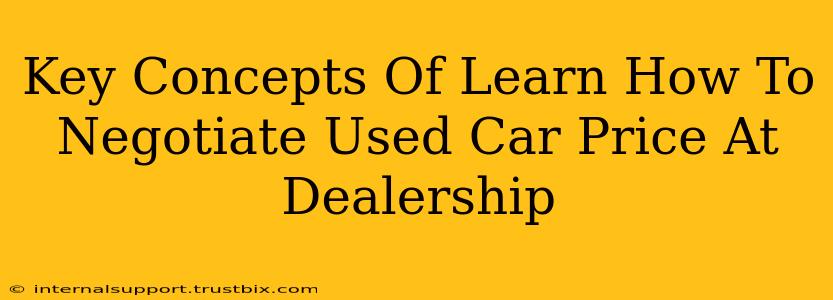Negotiating a used car price can feel like navigating a minefield, but with the right knowledge and strategies, you can secure a fair deal. This guide breaks down the key concepts to help you master the art of negotiation and drive away with a smile (and a great car!).
Understanding the Dealer's Perspective
Before diving into your negotiation tactics, it's crucial to understand the dealership's motivations. Dealerships operate on profit margins, aiming to sell cars at the highest possible price while still remaining competitive. They'll often start with a higher price, anticipating negotiation. Understanding this upfront helps you approach the negotiation with confidence and a realistic expectation.
Key Considerations for the Dealer:
- Profit Margin: Their primary goal is to make a profit on each sale.
- Inventory Turnover: They want to move cars off their lot to make space for new inventory.
- Competition: They're aware of the prices of similar vehicles at other dealerships.
- Your Willingness to Buy: They'll gauge your enthusiasm and use that to their advantage.
Preparing for Your Negotiation: Research is Key
Thorough preparation is half the battle. Don't walk into a dealership blind; research is your best weapon.
Essential Pre-Negotiation Steps:
- Research the Market Value: Use online tools like Kelley Blue Book (KBB) and Edmunds to determine the fair market value of the specific used car you're targeting. Consider the car's year, make, model, mileage, condition, and features. Knowing the fair market value empowers you to negotiate effectively.
- Identify Your Target Price: Based on your research, determine your ideal price, a slightly higher "walk-away" price (your absolute maximum), and a realistic target price you aim to achieve.
- Check the Vehicle History Report: Obtain a vehicle history report (like a Carfax report) to uncover any potential issues, accidents, or damage. This information gives you leverage during negotiations. Knowing the car's history puts you in a stronger position.
- Secure Financing (If Needed): Pre-approval for a car loan from your bank or credit union gives you negotiating power. Dealers often offer financing, but their rates might not be the most competitive. Pre-approval shows the dealer you're a serious buyer.
Negotiation Tactics: Mastering the Art of the Deal
Now comes the exciting part – the negotiation itself. Remember to stay calm, polite, and assertive.
Effective Negotiation Strategies:
- Start Low (But Reasonably): Begin your offer slightly below your target price, but not so low that it's insulting.
- Focus on the Price, Not the Features: While features are important, prioritize negotiating the overall price first. Discuss features after agreeing on the price.
- Use Silence Strategically: Don't be afraid of silence; it can create pressure on the dealer. Let them make the next move.
- Be Prepared to Walk Away: This is your strongest negotiating tool. If you're not comfortable with the price, be ready to leave. Often, the dealer will reconsider their offer if they believe they might lose the sale.
- Negotiate the Out-the-Door Price: Focus on the final price, including taxes, fees, and any additional charges. This prevents hidden costs from surprising you at the end.
- Be Friendly but Firm: Maintain a professional and respectful demeanor throughout the negotiation process.
Beyond the Price: Addressing Other Aspects
Negotiating a used car isn't solely about the price. Other aspects contribute to the overall deal.
Additional Negotiation Points:
- Trade-in Value: If you're trading in your old car, research its value beforehand and negotiate its trade-in value separately from the used car's price.
- Warranty: Inquire about extended warranties and negotiate their cost or inclusion in the deal.
- Fees and Charges: Carefully review all fees and charges, questioning anything unclear. Don't hesitate to negotiate these charges as well.
Post-Negotiation: Securing Your Deal
Once you've reached an agreement, ensure everything is documented accurately.
Final Steps:
- Review the Contract Thoroughly: Carefully read every line of the purchase agreement before signing.
- Ask Questions: Don't hesitate to clarify any uncertainties or ask for explanations.
- Get Everything in Writing: All agreements and promises should be documented in writing.
By understanding the dealer's perspective, preparing meticulously, employing effective negotiation tactics, and addressing all aspects of the deal, you can significantly increase your chances of getting the best possible price on your used car. Remember, patience, persistence, and knowledge are your greatest allies in this negotiation.

